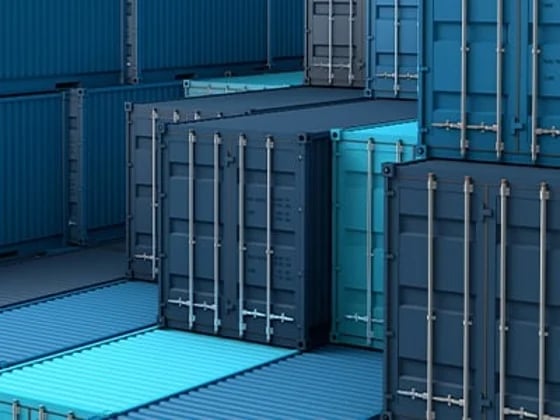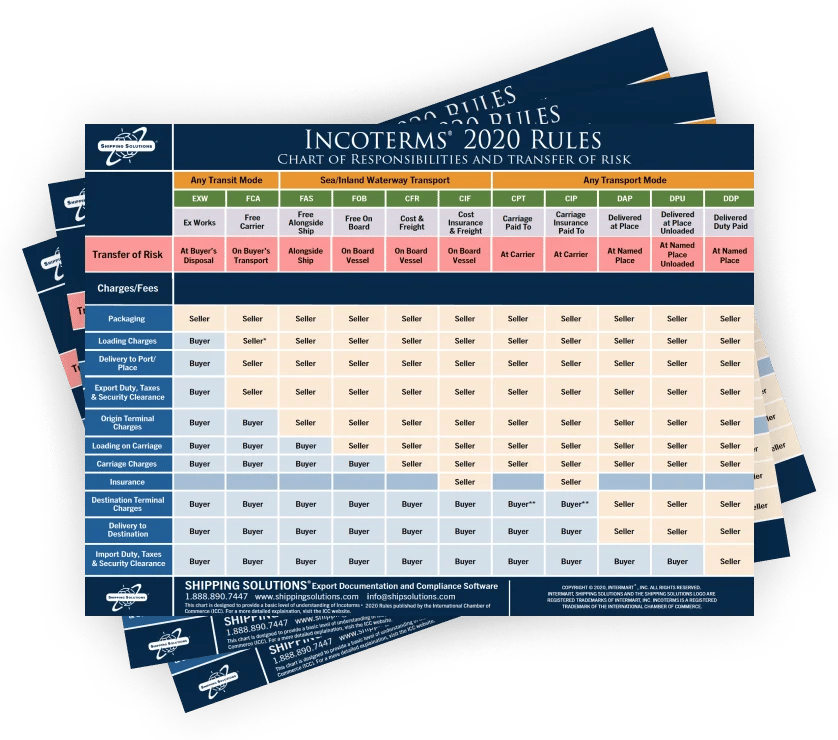The International Trade Blog International Sales & Marketing
Incoterms 2020 FCA: Spotlight on Free Carrier
On: November 25, 2024 | By:  David Noah |
8 min. read
David Noah |
8 min. read
 Incoterms 2020 rules are the latest revision of international trade terms published by the International Chamber of Commerce (ICC). They are recognized as the authoritative text for determining how costs and risks are allocated to the parties conducting international transactions.
Incoterms 2020 rules are the latest revision of international trade terms published by the International Chamber of Commerce (ICC). They are recognized as the authoritative text for determining how costs and risks are allocated to the parties conducting international transactions.
Incoterms 2020 rules outline whether the seller or the buyer is responsible for, and must assume the cost of, specific standard tasks that are part of the international transport of goods. In addition, they identify when the risk or liability of the goods transfers from the seller to the buyer.
There are 11 trade terms available under the Incoterms 2020 rules that range from Ex Works (EXW), which conveys the least amount of responsibility and risk on the seller, to Delivered Duty Paid (DDP), which places the most responsibility and risk on the seller. The Incoterms 2020 Rules: Chart of Responsibilities and Transfer of Risk summarizes the seller and buyer responsibilities under each of the 11 terms.
For a summary of Incoterms 2020 and a short definition of each of the 11 terms, read An Introduction to Incoterms, or watch the video below. Then, we’ll take an in-depth look at the Incoterm FCA, also known as Free Carrier.
Free Carrier Responsibilities and Risk
Under the Incoterms 2020 rules, FCA means the seller loads the goods on the buyer's transport at the seller’s premises, or the seller delivers them to another named place.
Most often, the buyer hires a transport that picks up the goods at the seller’s warehouse. The seller must load the goods on the buyer’s transport, at which point the risk for the goods transfers to the buyer.
Alternately, the seller and buyer may agree that the seller transport the goods to a place other than the seller’s warehouse such as the freight forwarder’s warehouse or the carrier’s terminal. The risk or liability for the goods transfers from the seller to the buyer when the goods are made available at the named place. In this case, the buyer is responsible for unloading the goods from the seller’s transport.
In both cases, the seller should package the goods appropriately or as specified in the agreement between both parties. In addition, the seller is responsible for export clearance.
Free Carrier and Routed Export Transactions
Most Incoterms experts argue that FCA is the best Incoterm to use when the buyer is arranging the main carriage of the goods, which means the international transportation. Sellers often choose this term because they think it minimizes the amount of effort on their part.
FCA is certainly a better option than Ex Works, which many U.S. companies like to use, but it puts responsibility for export clearance on the seller. That’s not necessarily a bad thing even though it can put the use of FCA in conflict with the U.S. Foreign Trade Regulations (FTR).
The FTR calls exports where the buyer arranges the international transportation a routed export transaction and requires the buyer to give written authorization for the Electronic Export Information (EEI) filing through AESDirect to a U.S. party.
To comply with the obligations assigned under both Incoterm 2020 FCA and the Foreign Trade Regulations, the buyer should provide written authorization to the seller to submit the EEI. For the seller, this gives them access to transportation information they may not otherwise be privy to if they weren’t doing the filing.
Free Carrier and Bills of Lading
The most significant change in Incoterms 2020 rules relates to FCA. Under this term, the buyer can now instruct its carrier to issue a bill of lading with an on-board notation to the seller so that the seller may satisfy the terms of a letter of credit.
Under an F-group rule, the “at a named place” is on the seller’s side, but the buyer hires the main carrier and freight forwarder. The seller does not control shipments under the F term, so the freight forwarder and carrier have no obligation to the seller.
This has caused problems in the past when selling under a letter of credit because international carriers would have no reason to provide the bill of lading to the seller who would typically need it to get paid under a letter of credit.
The FCA Incoterms 2020 rule provides a potential solution—the buyer and seller may agree in the sales contract that the buyer must instruct the carrier to provide the seller with an on-board transportation document.
While the buyer may instruct the carrier to provide the required bill of lading to the seller, there is no guarantee the carrier will comply. Even if they do, they will not issue the document before the goods are loaded, which may cause delays for the seller to get paid under the letter of credit.
Free Carrier Transportation Options
The ICC has divided the 11 Incoterms into those that can be used for any mode of transportation and those that should only be used for transport by “sea and inland waterway.” That’s because companies were too often choosing Incoterms where risk and responsibilities transferred at a point that made no sense in a non-ocean journey.
Under Incoterms 2020, FCA can be used for any mode of transport—air, courier, truck, rail, vessel or multi-modal shipments.
Using Free Carrier
As mentioned above, FCA is generally considered the best F-group Incoterm to use. However, those same experts will usually say FCA has some definite downsides for sellers:
- There are some challenges if using a letter of credit under FCA as described above.
- The seller may not be familiar with the freight forwarder being used.
- There is potential for diversion of the goods before they leave the United States, or to another country after they leave the U.S in violation of the Export Administration Regulations (EAR).
Some U.S. companies who sell to Mexico choose to use FCA. They deliver goods to the U.S. side of a border crossing, and then the buyer is responsible for transport over the border into Mexico.
Free Carrier Frequently Asked Questions (FAQs)
-
Is there a difference between FCA and Free On Board (FOB)?
FOB should only be used for sea and inland waterway transport. With FOB, the seller is responsible for loading the goods onto the shipping vessel. Because the seller is responsible for the goods until they are loaded on the vessel, they need to ensure the goods arrive at the vessel. Since most goods are now delivered to container yards rather than right to a particular vessel, FOB is normally used only in a few instances with containers at smaller ports.
-
Does FCA include insurance?
The two Incoterms that require insurance are CIF (Cost, Insurance and Freight) and CIP (Carriage and Insurance Paid To). Under FCA, the buyer will want to obtain insurance coverage for the goods during transit from the seller's premises to the final destination.
-
What is the difference between FCA and Ex Works (EXW)?
Under EXW, the buyer is responsible for collecting the goods from the seller's premises, for loading them on their transport and everything else necessary to get the goods to the final destination. Under FCA the seller has some added responsibility—loading the goods on the buyer’s transport.
-
What documents are required under FCA?
The documents required will vary depending on the specific terms of the agreement between the buyer and the seller. Common documents may include the bill of lading, commercial invoice, packing list and any necessary export/import licenses or permits.
-
What happens if the goods are lost or damaged during transport?
Under FCA, the buyer is typically responsible for filing a claim with their insurance provider to cover any damages or losses incurred.
-
Is FCA best for small or large shipments?
FCA can be used for both types of shipments, but it is typically more suitable for larger shipments where the buyer has the resources and infrastructure to handle transportation logistics.
Learn More about Incoterms 2020 Rules
If you are regularly involved in international trade, you need to understand the risks and responsibilities for each of the Incoterms 2020 rules, not just pick the term you always use. Start by getting a copy of ICC's Incoterms® 2020 Rules book.
For a more detailed understanding of which term or terms make the most sense for your company, register for an Incoterms® 2020 Rules seminar or webinar offered by International Business Training.
In addition, we've written free articles about each of the individual terms:
- EXW (Ex Works)
- FCA (Free Carrier)
- FAS (Free Alongside Ship)
- FOB (Free On Board)
- CFR (Cost and Freight)
- CIF (Cost, Insurance and Freight)
- CPT (Carriage Paid To)
- CIP (Carriage and Insurance Paid To)
- DAP (Delivered At Place)
- DPU (Delivered At Place Unloaded)
- DDP (Delivered Duty Paid)
If history is any indication, the Incoterms 2020 rules will be around for at least a decade. Now seems like the perfect time to make sure you understand each of the terms, so you can make sure you’re speaking the same language as your international trading partner.
This article was first published in February 2016 and has been updated and revised based on the changes made with the release of the Incoterms 2020 rules.
Like what you read? Subscribe today to the International Trade Blog to get the latest news and tips for exporters and importers delivered to your inbox.

About the Author: David Noah
As president of Shipping Solutions, I've helped thousands of exporters more efficiently create accurate export documents and stay compliant with import-export regulations. Our Shipping Solutions software eliminates redundant data entry, which allows you to create your export paperwork up to five-times faster than using templates and reduces the chances of making the types of errors that could slow down your shipments and make it more difficult to get paid. I frequently write and speak on export documentation, regulations and compliance issues.



